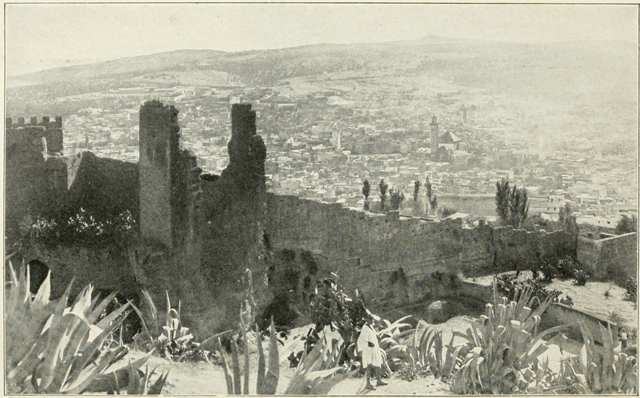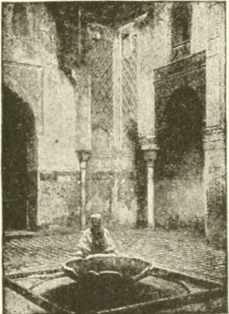IN MOROCCO

 From a photograph from the Service des Beaux-Arts auMaroc
From a photograph from the Service des Beaux-Arts auMarocFez Elbali from the ramparts
IN MOROCCO
BY
EDITH WHARTON
ILLUSTRATED

NEW YORK
CHARLES SCRIBNER'S SONS
1920
Copyright, 1919, 1920, by
CHARLES SCRIBNER'S SONS
Published October, 1920
THE SCRIBNER PRESS
TO
GENERAL LYAUTEY
RESIDENT GENERAL OF FRANCE IN MOROCCO AND TO
MADAME LYAUTEY,
THANKS TO WHOSE KINDNESS THE JOURNEY
I HAD SO LONG DREAMED OF
SURPASSED WHAT I HAD DREAMED
PREFACE
I
Having begun my book with the statement that Morocco still lacks aguide-book, I should have wished to take a first step toward remedyingthat deficiency.
But the conditions in which I travelled, though full of unexpected andpicturesque opportunities, were not suited to leisurely study of theplaces visited. The time was limited by the approach of the rainyseason, which puts an end to motoring over the treacherous trails of theSpanish zone. In 1918, owing to the watchfulness of German submarines inthe Straits and along the northwest coast of Africa, the trip by seafrom Marseilles to Casablanca, ordinarily so easy, was not to be madewithout much discomfort and loss of time. Once on board the steamer,passengers were often kept in port (without leave to land) for six oreight days; therefore for any one bound by a time-limit, as mostwar-workers were, it was necessary to travel[Pg viii] across country, and to beback at Tangier before the November rains.
This left me only one month in which to visit Morocco from theMediterranean to the High Atlas, and from the Atlantic to Fez, and evenhad there been a Djinn's carpet to carry me, the multiplicity ofimpressions received would have made precise observation difficult.
The next best thing to a Djinn's carpet, a military motor, was at mydisposal every morning; but war conditions imposed restrictions, and thewish to use the minimum of petrol often stood in the way of the secondvisit which alone makes it possible to carry away a definite anddetailed impression.
These drawbacks were more than offset by the advantage of making myquick trip at a moment unique in the history of the country; the briefmoment of transition between its virtually complete subjection toEuropean authority, and the fast approaching hour when it is thrown opento all the banalities and promiscuities of modern travel.
Morocco is too curious, too beautiful, too rich[Pg ix] in landscape andarchitecture, and above all too much of a novelty, not to attract one ofthe main streams of spring travel as soon as Mediterranean passengertraffic is resumed. Now that the war is over, only a few months' work onroads and railways divide it from the great torrent of "tourism"; andonce that del